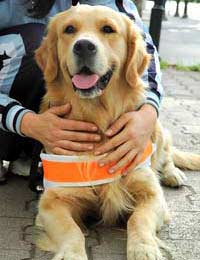Train Working Dogs

Training working dogs, for whatever purpose, starts with making the right selection of dog for the job. Selective breeding to enhance the desired traits of working dogs has already done part of the work.
What is a Working Dog?
Since man domesticated the first wild dog our relationship with this canine animal has grown and become more intensified. Working dogs are defined by their breed’s characteristics and the job they are most suitable for. The groups include:- Herding/droving/pastoral
- Terriers
- Hounds
- Sporting gun dogs
- Non-sporting
- Hunting dogs
Here are further work-related categories within these groups. For example, hounds vary considerably in the way they hunt their quarry: greyhounds and whippets have excellent eyesight, to see their prey; bloodhounds rely on their acute sense of smell and literally follow their noses; some hounds use both senses.
The term working dog also applies to dogs produced to do specific jobs like search and rescue, St Bernards and Newfoundlands. Sled dogs, guard dogs, therapy dogs, assistance dogs, sniffer dogs and cadaver dogs all have totally different roles, but they are all trained working dogs.
Choosing the Dog for the Job
Trainers are often also recognised breeders of their ‘speciality’ dogs. They know what they’re looking for in the breed and will have first pick of litters! An experienced and competent trainer will be able to identify certain character traits for potential future working dogs, that extra ‘something’ that makes them stand out. Some particular bloodlines are often preferred because they have produced consistently good dogs for the job.Breed type and pedigree are important aspects of training working dogs because much of the work that is asked of them has been bred into them through generations, and is therefore instinctive. Certain temperament traits are associated with different breeds too. Training is based on how to use positive reinforcement methods to develop a young animal and fine tune the instinctive behaviour so that it may fulfil its potential as a working dog.
Basic Training
Each type of working dog has a different training regime designed to suit the dog to the job. In brief, terriers can be one of the most difficult to train because they have been bred to be independent and noisy! Their role was to dig up underground dens and burrows (go to ground) then bark to alert the handler of their quarry’s whereabouts and then continue barking to intimidate the animal underground. Socialising and obedience training are an absolute necessity for these dogs if they are to be kept as pets.An introduction to the dog’s expected future working world will be made as soon as possible with a young dog. This encourages the pup to familiarise itself with the sights, sounds and smells of that environment. Kind but firm handling and patient repetition with young dogs achieves the best results.
As a general rule, handlers will praise and reward the traits shown by the dog that they wish to encourage. If each action is then identified by a word, whistle, or hand signal, the dog will learn to associate that signal with the action and want to do this because it pleases the dog’s pack leader - the handler. Repetition of chosen signal to action or movement each time it’s executed, reinforcement of signal to action, (e.g. ‘good sit’) then reward. This can be a pat, a treat or favourite toy, depending on objectives.
Retrievers are supposed to retrieve, pointers supposed to point, setters supposed to set up. These actions are instinctive, but to implement these traits to work for us needs a little more help. For instance, dogs being trained to use their acute sense of smell will be encouraged, through play, to rely on their noses. Use nose effectively to find hidden object, get desired reward.
Summary
The subject of training working dogs is too enormous to even summarise in one article, but, briefly it is a matter of utilising and developing what the dog instinctively has to work with, to achieve the desired results through play and positive reinforcement methods.Business Energy With a Difference
If you are looking for business energy or need advanced solutions like remote energy monitoring, new supplies, downgrading or upgrading capacity, have a no obligation chat with Purely Energy.
To find our more get in touch here. or call 0161 521 3400.







